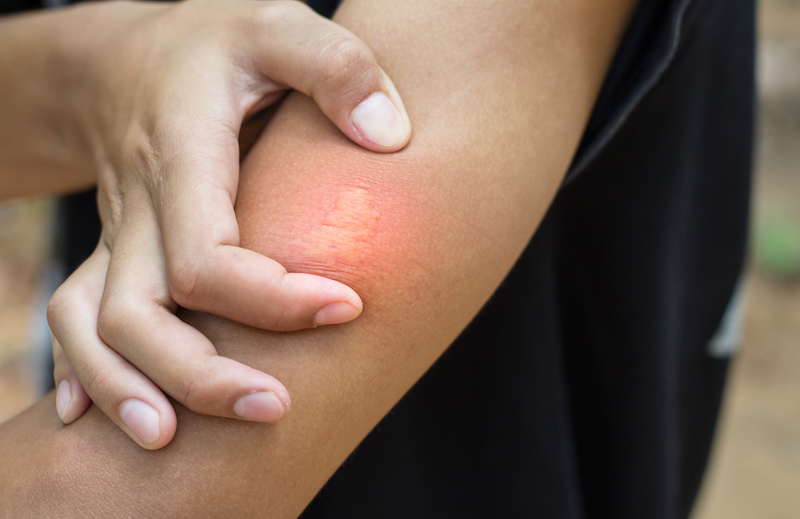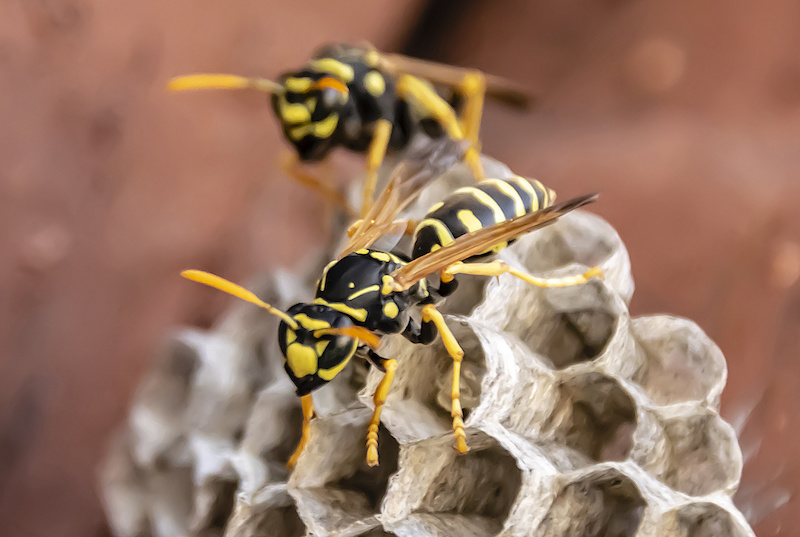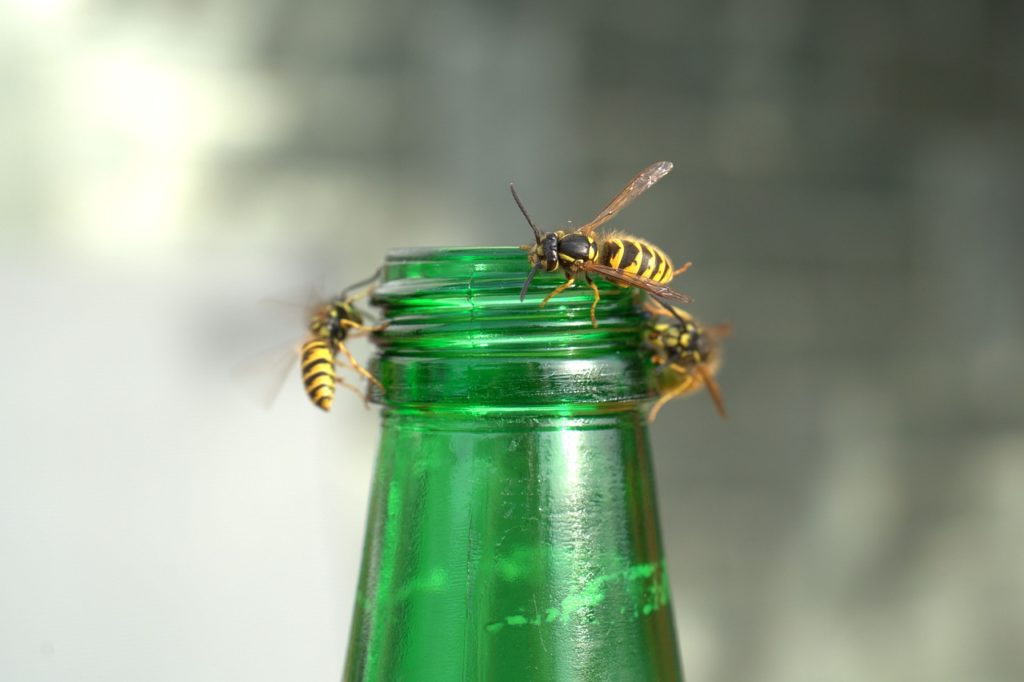Table of Contents
- Symptoms and Signs of Delayed Wasp Sting Reactions
- Causes and Triggers of Delayed Wasp Sting Reactions
- How to Prevent Wasp Stings
- Best Treatment for a Wasp Sting
- When to Seek Medical Help for Delayed Wasp Sting Reactions
- FAQs about Delayed Wasp Sting Reactions
- Resources and Support for Delayed Wasp Sting Reactions
- Professional Wasp Control in Douglas & Lincoln Counties
Ouch, was that a wasp?
Have you ever been stung by a wasp and found yourself dealing with a delayed reaction? Delayed wasp sting reactions can catch you off guard and may lead to serious health issues, as well.
In this article, we’ll explore the nuances of delayed wasp sting reactions, including symptoms, causes, and effective treatment options. By understanding these reactions, you’ll be better prepared to handle them and know when to seek medical help.
Symptoms and Signs of Delayed Wasp Sting Reactions
Delayed reactions to wasp stings can present in several ways, making them somewhat elusive and tricky to identify. Typically, you’ll notice symptoms such as swelling, redness, and itching around the sting site.
What makes these reactions particularly concerning is that they may not appear immediately; instead, these symptoms can develop hours or even days after the sting, catching you off guard.
In some instances, the reaction may escalate to more severe symptoms, including difficulty breathing, dizziness, or a rapid heartbeat. If you notice any worsening of symptoms or if they persist, it’s important not to hesitate—seek medical assistance right away.

Early intervention can make a significant difference, especially if you’re experiencing a severe allergic reaction, which can be life-threatening. Being aware and proactive can help you stay safe and feel more in control after a wasp sting.
Causes and Triggers of Delayed Wasp Sting Reactions
Delayed wasp sting reactions happen when your immune system overreacts to the venom introduced by the wasp. While the exact cause of this overreaction remains somewhat unclear, several factors can cause it to happen.
Individuals with allergies to wasp stings or those who have previously experienced severe reactions are at a higher risk for delayed symptoms. Plus, receiving multiple stings at once can amplify this risk. Other potential triggers include stress, certain medications, and existing health conditions.
By recognizing these factors, you can take proactive steps to minimize the risk of delayed reactions and protect your well-being. Awareness is key, allowing you to better prepare and respond effectively if a wasp sting occurs.
How to Prevent Wasp Stings
If you have a known allergy to wasp stings or have experienced severe reactions in the past, taking precautions is essential. Avoid areas where wasps tend to nest, like gardens and outdoor dining spaces.
When enjoying the outdoors, consider wearing protective clothing, such as long sleeves and pants, to reduce exposure. Additionally, if you’re at high risk for a severe reaction, carrying an epinephrine auto-injector can be a lifesaver. By being proactive and mindful of your surroundings, you can significantly lower the chances of experiencing a delayed reaction to a wasp sting.
Check out our blog, Best Wasp Traps (2024) For Your Douglas & Lincoln County Home, for more information on how to prevent wasps from building around your home.
Best Treatment for a Wasp Sting
If you experience a delayed wasp sting reaction, don’t worry—there are effective treatment options to help ease your discomfort. Over-the-counter antihistamines can reduce itching and swelling, providing much-needed relief. A cold compress applied to the affected area can also soothe inflammation and help alleviate pain.
For more severe reactions, it’s important to consult a doctor who may prescribe corticosteroids or an epinephrine auto-injector to manage your symptoms effectively. Always stick to the recommended treatment plan, and if your symptoms worsen or fail to improve, don’t hesitate to seek medical attention.
When to Seek Medical Help for Delayed Wasp Sting Reactions
While many wasp stings can be handled at home, it’s vital to know when to seek medical assistance. If you experience symptoms like difficulty breathing, tightness in your chest, or swelling of the face, lips, or throat, don’t wait—get medical help right away.
These signs may signal a severe allergic reaction known as anaphylaxis, which requires immediate attention. Remember, it’s always better to be safe than sorry. If you’re ever uncertain about the severity of your reaction, reaching out for help is the best course of action. Your health is worth it!
FAQs about Delayed Wasp Sting Reactions
Q: Can anyone experience delayed wasp sting reactions?
A: While anyone can be stung by a wasp, not everyone will experience a delayed reaction. Those who are allergic or have had severe reactions in the past are more likely to experience delayed symptoms.
Q: Are these reactions dangerous?
A: In most cases, delayed wasp sting reactions are not life-threatening. However, severe reactions can occur, and it is important to seek medical help if you experience difficulty breathing or other severe symptoms.
Q: Can I prevent wasp sting reactions?
A: While it is not always possible to prevent a negative or allergic reaction to a wasp sting, taking preventive measures, such as avoiding wasp-infested areas and wearing protective clothing, can reduce the risk.
Q: How long do delayed wasp sting reactions last?
A: The duration can vary. Mild symptoms may subside within a few days, while more severe reactions can last up to a week or longer.
Resources and Support for Delayed Wasp Sting Reactions
If you are seeking more information or support regarding delayed wasp sting reactions, there are resources available to help you. Reach out to your healthcare provider for personalized advice and guidance. Additionally, organizations such as the American Academy of Allergy, Asthma & Immunology can provide valuable resources and support.
Professional Wasp Control in Douglas & Lincoln Counties
Delayed wasp sting reactions can be unsettling, but with knowledge and preparedness, you can navigate through them more confidently. By understanding the symptoms, causes, and treatment options, you can take preventive measures and seek help when needed.

Remember, if you are experiencing a severe reaction or are unsure about the severity of your symptoms, always seek immediate medical attention. For all of your wasp nest removal needs in the Omaha & Lincoln areas, RECON Pest Services is here to help. Contact us today for a free quote!






